Table of Contents
Iodine is an essential trace element that combines with the amino acid tyrosine to form thyroid hormones T4 and T3. Thyroxine (T4) contains four iodine atoms, and triiodothyronine (T3) contains three iodine atoms.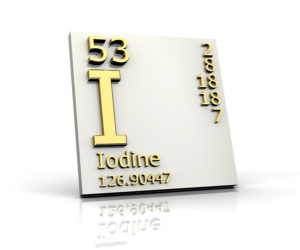
Iodine deficiency is recognized as the most common cause of preventable brain damage in the world. Even moderate deficiency results in a loss of at least 10 – 15 IQ points.[i] And the reason we’ve added iodine to our list of essential nootropics.
Insufficient iodine is not only a problem in developing countries. Studies have found even in Western countries; iodine deficiency has become a critical health problem.[ii]
Your thyroid gland absorbs iodine from your blood supply to make and release thyroid hormones. Your thyroid affects every cell in your body and brain through the hormones T4 and T3.
Within your brain, T4 is converted to T3 by selenium which then affects gene expression controlling metabolism within cells. And activates the catecholamines dopamine, norepinephrine and epinephrine.
Malfunctioning thyroid function which is often caused by insufficient iodine results in poor cognition, difficulty learning, problems with recall, depression and anxiety.
Iodine helps:
- Neurotransmitters: Iodine is required for the production of thyroid hormones T4 and T3. Thyroid hormone receptors in the brain help regulate the production and use of all important neurotransmitters.
- Brain Energy: Iodine is necessary for the production of thyroid hormones which help control cellular metabolism and energy use within brain cells. Supplemental Iodine usually results in increased energy levels and feelings of well-being.
- Neuroprotectant: Iodine can kill bacteria, fungal infections, and viruses. Iodine will remove fluoride, chlorine and bromine.[iii] And helps your body detox heavy metals like mercury and cadmium that other detox methods can’t remove.
What is Iodine?
Iodine is an essential trace element needed for the creation of thyroid hormones in your body. Iodine combines with the amino acid tyrosine to produce thyroxine (T4) and triiodothyronine (T3).
The most abundant source of Iodine in our diet comes from seafood like kelp, saltwater fish, seal meat, whale meat, oysters, mussels and lobster.
Iodine is also found in beans, milk and milk products, eggs, spinach and vegetables grown in or produced from soil rich in iodine. Typically found near coastal areas of the world.
The most seriously iodine-deficient parts of the world are mountainous and inland areas. Including much of the agricultural producing areas of Western countries like Australia, Canada, USA and Europe.
Iodine is absorbed by your thyroid gland for the production of thyroid hormones. The pituitary gland in your brain releases thyroid stimulating hormone (TSH) instructing your thyroid to release T4 and T3.
T4 and T3 are produced by combining tyrosine (thyroglobulin) with iodine and released into your blood stream. Thyroid transport proteins then carry the hormones to target cells all over your body including your brain.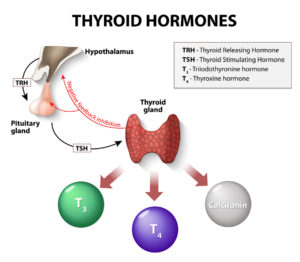
Nearly all of your body’s functions in nearly every tissue rely on thyroid hormones. Their actions and influence are so wide ranging that you cannot live without them.
Thyroid hormones affect brain development, heart rate, lung function, blood function, bone growth, steroid hormone production, including the breakdown of sugar, fat and protein. And even some immune processes.
Iodine is even involved in how the other nootropics in your stack are utilized by cells in your brain. The bottom-line is Iodine could be one of the most important additions to any nootropic stack.
How does Iodine work in the Brain?
Iodine boosts brain health and function in several ways. But two in particular stand out.
- Iodine is critical for neurotransmitters. Iodine is required for the production of thyroid hormones T4 and T3. Thyroid hormone receptors in the brain help regulate the production and use of all important neurotransmitters.
Not enough iodine results in too little T3 and T4 in your body. Symptoms of inadequate thyroid hormones (hypothyroidism) include insomnia, fatigue, difficulty concentrating, depression, dry skin and hair, cold sensitivity, frequent and heavy periods for woman, and joint and muscle pain.
- Iodine is required for a healthy immune system. Iodine is antibacterial, antiparasitic, antiviral and has anticancer properties.
Your thyroid is the main storage site for iodine. But this mineral is also concentrated in your glandular system including your salivary and sweat glands. Ovaries, breasts, pancreas, cerebral spinal fluid, skin, stomach, prostate and your brain all contain high concentrations of iodine.
Iodine is a powerful method for removing heavy metals and halides like fluoride, chlorine and bromine from your system. These chemicals compete for the same thyroid receptors in cells used by thyroid hormones. So removing these toxins will help thyroid hormones do their job of gene expression and metabolism.
How things go bad
Iodine is needed by the thyroid to produce the thyroid hormones T4 and T3. Part of the endocrine system, the thyroid secretes hormones that enter your circulatory system. And are transported throughout your body. Every cell has receptor sites for thyroid hormones.
Neurotransmitters are used by neurons to communicate with one another. The presynaptic neuron releases a neurotransmitter which then binds to a receptor on the postsynaptic cell.
Here we’re going to explore how neurotransmitters relate to the endocrine system and thyroid health. And what can go wrong.
Thyroid hormones are involved in the gene expression needed for neurotransmitter release.[iv] Low levels of iodine result in low levels of thyroid hormones which result in low neurotransmitter levels.
Iodine and Serotonin
Several studies have shown that low T3 results in reduced levels of serotonin in the brain. If you don’t respond to SSRI’s for depression it could be due to a thyroid hormone imbalance.[v] The result is depression.
Iodine and GABA
In animals and humans there is a direct link between thyroid levels and GABA. Thyroid hormones affect enzymes responsible for synthesis and degradation of GABA, levels of glutamate and GABA, GABA release and reuptake, and GABA(A) receptor expression and function.[vi]
GABA is your brain’s natural Valium. GABA can help turn off stress after you get upset. Or even prevent a stress response in the first place. Low iodine results in low levels of thyroid hormones affecting GABA. Which can lead to depression or anxiety.
Iodine and Dopamine
Thyroid hormones play a role in dopamine release in the brain.[vii] One study showed that an imbalance between thyroid hormones and dopamine could be responsible for restless leg syndrome.[viii]
Iodine and Acetylcholine
Thyrotrophic-releasing hormone (TRH) increases acetylcholine (ACh) synthesis.[ix] One study showed that those with hypothyroidism had significantly decreased acetylcholine in the hippocampus. And that administration of T4 normalized ACh levels.[x]
Insufficient iodine can result in hypothyroidism. And negatively affect ACh synthesis in the brain. Affecting cognition, memory, learning, recall and mood.
Not enough iodine in your diet negatively affects neurotransmitters in your brain. And can result in depression, brain fog, anxiety, learning and memory problems, and ultimately lead to neurodegenerative diseases like Alzheimer’s and Parkinson’s.
Iodine benefits
Most neurohackers associate Iodine with the thyroid because Iodine is needed to produce thyroid hormones T4 and T3. But Iodine is also concentrated in your salivary glands, stomach, breasts, ovaries, eyes and in your brain.
Deficiency in Iodine in any tissue will cause problems in that area of your body. And weaken your immune system. Symptoms of low Iodine show up as brain fog, skin problems, fibroids, fibromyalgia, and chronic fatigue.
Iodine can kill bacteria, fungal infections, and viruses. Iodine will remove fluoride, chlorine and bromine.[xi] And helps your body detox heavy metals like mercury and cadmium that other detox methods can’t remove.
Iodine helps prevent and even reverse breast cancer. And helps prevent mental retardation in young children.
Your brain needs sufficient Iodine for cognition through several mechanisms of action. This essential element is involved in gene expression that controls the synthesis of neurotransmitters in your brain. And how they work.
Iodine helps remove fluoride throughout your body including your brain. Studies show that fluoride can damage your brain, reduce intelligence, and impair memory. Fluoride has even been associated with dementia according to a study by The National Academies of Science, Engineering and Medicine.[xii]
One recent study showed that water fluoridation in England is linked to higher rates of underactive thyroid.[xiii] One of the simplest things you can do to boost cognition and your thyroid is to stop using fluoridated water and toothpaste. And start supplementing with Iodine to remove the fluoride toxicity and boost thyroid health.
Iodine Deficiency Disorders are considered one of the biggest worldwide public health problems today. Studies around the world show none of us are immune from Iodine deficiency. Estimates range from 10 – 90% of the world population don’t get sufficient Iodine depending on where you live.[xiv]
Adding Iodine to your stack if you are deficient is one of the easiest and least expensive ways to prevent and even cure a host of health problems. Including boosting cognition and memory.
How does Iodine feel?
Many neurohackers report an increased level of focus, energy, memory, and cognitive ability when supplementing with Iodine.
You should also experience improved quality of sleep. And have an overall improvement in mood.
Others report a profound difference in energy levels, they are more alert, and fatigue in the afternoon disappears. A few even report a significant improvement in tinnitus.
Iodine Clinical Research
One of most common reasons we use nootropics is to boost memory and mental energy. Memory loss drastically reduces quality of life. And simple brain fog makes it difficult to accomplish the simplest of tasks.
Research has shown that Iodine is involved in memory, learning and cognition on several levels. And supplementing with Iodine is one of the most fundamental things you can do to boost cognition.
Iodine raises the world’s IQ
The world’s greatest concentration of iodine deficient countries in the 1990’s was the former Soviet republics of Central Asia. Worldwide, about 2 billion people or a 3rd of the world population get too little iodine.
Studies show that iodine deficiency is the leading preventable cause of mental disorders. Even moderate deficiency lowers intelligence by 10 – 15 IQ points.
The most visible and severe effects manifest as goiters, dwarfism and cretinism. Ever hear someone use the derogatory term “cretin” to describe someone with low intelligence?
Cretin describes a child born and raised with severe mental disabilities, small stature and weakness all due to not enough Iodine in the mother’s diet when she was pregnant.
 In Japan, people get Iodine from seafood, seaweed, vegetables grown in Iodine-rich soil or animals that eat grass grown in that soil. But even in wealthy nations like the USA and the UK, people still need to supplement. Usually by using iodized salt. Or adding it to their stack as a supplement.
In Japan, people get Iodine from seafood, seaweed, vegetables grown in Iodine-rich soil or animals that eat grass grown in that soil. But even in wealthy nations like the USA and the UK, people still need to supplement. Usually by using iodized salt. Or adding it to their stack as a supplement.
According to Dr. Gerald Burrow, a former dean of Yale’s medical school, “For 5 cents per person per year, you can make the whole population smarter than before”. Simply by adding iodine to the salt supply.
Back in the old Soviet republic, Kazakh children were stunted compared to same-age Russian children. A survey of 5,000 households in 1996 found that 10 percent of children were stunted. And iodine deficiency identified as the main culprit.
In Kazakhstan, Turkmenistan, Tajikistan, Uzbekistan, and Kyrgyzstan campaigns were run promoting iodized salt. Salt companies were persuaded to add iodine to salt before putting it in stores.
In Kazakhstan in 1999, only 29% of households were using iodized salt. Now, 94% of households are. And in 2007, the United Nations certified the country officially free of iodine deficiency disorders.
In raising the world’s IQ, the secret’s in the salt.[xv]
Iodine deficiency and ADHD
A 10-year study conducted in Italy investigated the children born to 16 women from an iodine-deficient area (Area A) and 11 control women in an iodine-sufficient area (Area B).
ADHD was diagnosed in 11 of the 16 children born in Area A but none in Area B. Total IQ score was nearly 20-points lower in Area A children compared to Area B.
The researchers noted that the prevalence of ADHD in children born in Area A could only be compared to similar children with a resistance to thyroid hormones.
And that iodine-deficiency was the likely cause of ADHD due to a critical reduction in intracellular thyroid hormone T3 available to the developing brain.[xvi]
Iodine Recommended Dosage
Recommended Iodine dosage is very difficult because everyone needs different amounts based on your body’s ability to use the Iodine. And the level of exposure you have to daily toxins like fluoride, chlorine, and other halides.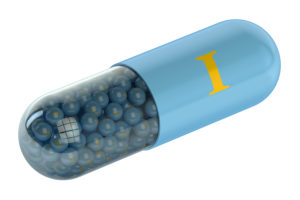
If you are dealing with a severe health problem, then your dosages would need to be higher that someone trying to maintain good health.
Maintenance and for optimal cognition – Natural health doctors have been recommending up to 50 mg of Iodine per day. But I’ve since revised my recommendations based on the latest research and potential health problems caused by iodine toxicity.
The maximum adult dosage for adult is 1 mg Iodine per day. Recommended maintenance dosage is the same.
Cancer – Cancer is a result of mutated cells. Iodine is critical for the P53 gene which prevents damaged cells from dividing.[xvii] Iodine and selenium helps P53 do its job of eliminating abnormal cells. Cancer patients have used 50 – 300 mg of Iodine per day successfully.
Supporting supplements to take with Iodine include:
- Selenium – 200 mcg per day. Selenium is required for the production of T3. And assists in detox.
- Vitamin C – 2,000 – 5,000 mg per day helps support thyroid symporters which transport thyroid hormones through the body including across the blood-brain barrier. And assists in detox.
- Magnesium – 400 mg per day. See my post on Magnesium as a nootropic.
Iodine should be taken with food particularly if you have a sensitive stomach. The supporting supplements can be taken at the same time as your Iodine dose.
Iodine should be taken early in the day because it can increase energy levels so much you could have problems sleeping.
Iodine Side Effects
Most forms of Iodine can cause diarrhea and bloating. Particularly at higher doses. Those with a sensitive stomach could experience stomach pain and is the reason we suggest taking Iodine with food.
It is also possible to overdose on Iodine. So please start at a lower dose and see how your body reacts. Symptoms of Iodine overdose include abdominal pain, delirium, fever, vomiting and shortness of breath.
Iodine is a powerful method for removing toxins and heavy metals from your body which can also produce unpleasant effects. If you experience flu-like symptoms when starting Iodine its very likely you’re feeling the effects of toxins being flushed out of your cells and your body.
For more on Iodine toxicity, here’s information from Nature Reviews Endocrinology.
Types of Iodine to Buy
Iodine is sold in many forms but the main thing to look for; does the product contain both Iodine and Iodide. Your body needs both forms. Breasts look for Iodine and the thyroid needs Iodide. Contrary to some sources; your body cannot convert supplemental Iodine to Iodide.
Also important is to understand and recognize the difference between milligram (Mg) doses vs. microgram (Mcg) amounts. Mcg doses is how most mainstream as well as integrative health practitioners recommend Iodine dosage .
Recommended forms
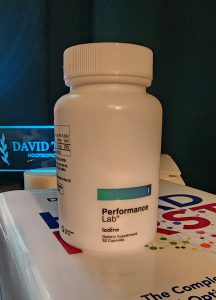 I highly recommend Click for Performance Lab® Iodine which is pure and produced using NutriGenesis® technology which is a highly bioavailable form of Iodine.
I highly recommend Click for Performance Lab® Iodine which is pure and produced using NutriGenesis® technology which is a highly bioavailable form of Iodine.
Other options include:
- Lugol’s liquid – Iodine/Potassium Iodide – 2% and 5% solutions. 2% solution is 2.5 mg/drop and 5% solution is 6.25 mg/drop
- Iodoral – Lugol’s formula in pill form – Iodine/Potassium Iodide – 12.5 mg and 50 mg
- Biotics Research Iodizyme – 12.5 mg per tablet of Iodine/Iodide
- Tri-Iodine by Vitaminlife – 12.5 mg per tablet of Iodine/Iodide
Other forms not recommended
- “Nascent Iodine” which is iodine in its atomic state and is a very low dose. Not enough to detox heavy metals, fluoride, bromine and chloride. Or to saturate tissues.
- Iosol which is Iodine only, and the micro doses have the same issues as Nascent Iodine
- Prolamine which has 3 mg of Iodine and 20 mg of Calcium may be too low to detox the body and saturate tissues
- Pure Encapsulations, Solaray, Source Naturals, Progressive Labs and NOW all offer mcg doses of Iodide only
- Kelp because of low Iodine status, not being able to determine levels of Iodine and possibly toxic due to arsenic and halides
Nootropics Expert Recommendation
Iodine up to 1 mg per day
 I recommend using Iodine as a nootropic supplement.
I recommend using Iodine as a nootropic supplement.
Your body does not make Iodine on its own. So to get its benefits it needs to come from your diet. Or you must take it as a supplement.
Iodine is especially helpful for those dealing with brain fog, poor cognition and memory, low energy levels and a sluggish thyroid.
Iodine is also particularly useful to help rid your body of the daily toxins we’re exposed to every day including heavy metals, fluoride, chloride, bromine and other halides.
While most forms of Iodine are helpful for overall health, keep in mind it’s the thyroid hormones T4 and T3 which influence cognitive health.
Thyroid hormones are produced from tyrosine and Iodine. And the production of T3 from T4 requires selenium which should be a part of your stack when using Iodine.
I recommend an Iodine supplement which contains both Iodine and Potassium Iodide to boost cognition.
Iodine is a fast-acting nootropic that can also help prevent brain degeneration later in life.
I highly recommend Click for Performance Lab® Iodine which is pure and produced using NutriGenesis® technology which is a highly bioavailable form of Iodine.

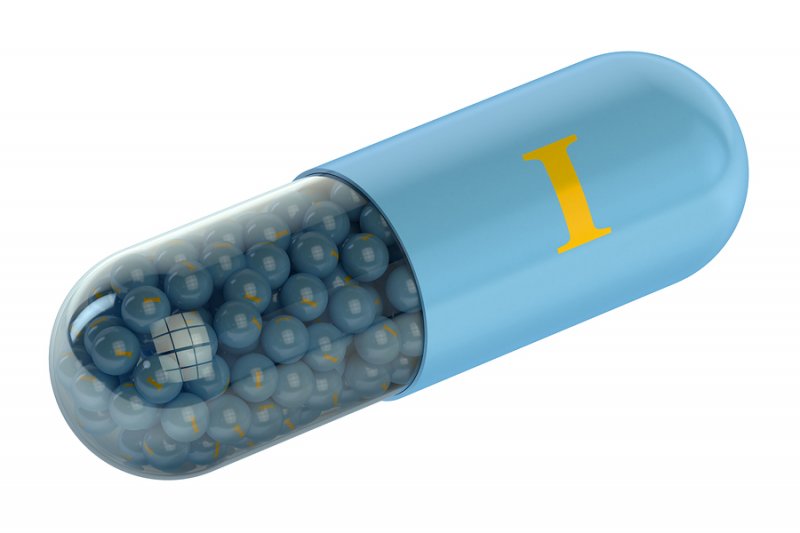







Join The Discussion - 271 comments
Salah
June 28, 2018
I have high blood pressure and I take Atenolol tablets 100 mg and Candesartan Cilexetil / Hydrochlorothiazide 16 mg / 12.5mg tablets.
Does iodine interact with these medications?
Which iodine supplement do you recommend for me to use?
Thank you.
David Tomen
June 29, 2018
Salah, I’ve used Lugol’s and Pure Encapsulations in the past with good results. I now get my daily iodine dose from the multivitamin I use: Performance Lab Whole-Food Multi for men.
As for iodine interactions, I suggest you use this interaction checker here: https://www.drugs.com/drug_interactions.html
Lasse
January 15, 2019
Just out of curiosity: Do you get your full daily iodine dose just from Performance Lab Whole-Food Multi or do you use an additional supplement? On the Performance Lab website, it says Whole-Food Multi contains 0.15 mg per serving. Isn’t this a fairly low dose compared to your recommendation of 25 – 50 mg per day?
Thanks again and keep up the great work!
Best regards
Lasse
David Tomen
January 16, 2019
Lasse, at the moment my daily iodine dose comes from Performance Lab Whole-Food Multi only. Thanks for the reminder because I need to order more Lugol’s.
Pati
May 11, 2018
I’m allergic to seafood. I was told since I’m allergic to seafood that it was probably the iodine in it. When I go to the doctor’s I tell them I’m allergic to iodine. I love seaweed and eat it when I can. From what I read foods are sufficient enough. What are some good options for me (if any) to get iodine? I have chronic fatigue and am desperate for some relief.
David Tomen
May 11, 2018
Pati, if you are “allergic” to iodine you will not survive. Your body requires iodine to make things like your thyroid hormones. I’m not an expert on allergies and certainly am not a doctor. But “seafood” does not equal “iodine”.
Iodine is also found in beans, milk and milk products, eggs, spinach and vegetables grown in or produced from soil rich in iodine. Typically found near coastal areas of the world. If you do not live in a coastal area and/or get your food grown in coastal areas, and if you don’t use iodized salt you are likely deficient in iodine.
There is no other “option” to iodine. We all need it everyday. Try a quality iodine supplement from one of the trusted supplement manufacturers and figure out how much you need to take. You may get some relief from your chronic fatigue.
Stephen
May 6, 2018
Good article on the benefits of iodine.Have personally been on mostly a half a 12.5 iodoral tablet for 2 years, after my Dr recommended it as i was choking on food on occasions.Also he found mercury in my blood as a result of 8 amalgams filling being in my mouth for 50 years.Dr david Brownstein has an excellent book on the wonders of iodine.
I have now removed all my fillings and am starting to increase my intake of iodine.I stopped choking on my food within 2 weeks,and lost my cold hands and feet.
My supplement regime
Iodine
L-Selenium 200-400mcg
D-3 5000-1000IU a day
Magnesium 400mg
MSM Sulphur. a couple heaped tsp a day
B vitamins
Vit C 5G a day
NAC 1 tab
ALA 1 tab
David Tomen
May 6, 2018
Thank you for your comment Stephen. It’s always encouraging to hear another ‘good news’ story. Because it gives people hope and that it is entirely possible to get better.
Håkon Martin NIlsen Bjerke
April 10, 2018
Wouldnt higher doses of iodine push the other minerals the thyroid require push them into relative deficiency?
David Tomen
April 11, 2018
It shouldn’t suppress the levels of other minerals your thyroid needs. But why use excessively high doses of Iodine? Your body and thyroid can only use so much. Like most everything in your body, too much of anything is not good. And in some cases throws things off balance. Not the way nature intended.
Think of it this way … Would you try to ‘push’ more gasoline into your car’s engine to make it work better? An engine is designed to use a certain amount of fuel depending on the load put on it. Trying to ‘force’ more fuel will not help. And in fact, will likely ‘choke’ the engine and it’ll quit.
Joren
May 5, 2018
You say not to take high levels of iodine because that’s not how nature intended us to work, yet recommend 25-50mg a day?
The only natural way to consume this is to eat 1-2 ounces of kelp a day, I can’t find a lot of evidence that our ancestors ate a lot of kelp.
Also there is evidence that going above 500 micrograms can suppress T4 production, and in those with Hashimotos any level of iodine will increase TPO antibodies.
David Tomen
May 6, 2018
Joren, our ancestors, and in particular in coastal areas of the world, got their iodine from beans, milk and milk products, eggs, spinach and vegetables. And not just kelp.
I suggest you read this post again with a more open mind. I’m not a doctor. Do not even play one on TV. The post clearly says, “Recommended Iodine dosage is very difficult because everyone needs different amounts based on your body’s ability to use the Iodine.” And “Natural health doctors are now recommending a minimum of 50 mg of Iodine per day.” It’s up to the individual to determine how much iodine their body requires.
Please provide the evidence for “going above 500 micrograms can suppress T4 production, and in those with Hashimotos any level of iodine will increase TPO antibodies.” And I’ll gladly update this review.
Håkon Martin NIlsen Bjerke
March 4, 2018
This guy just bluntly said that iodine supplemention above 1mg aday increase the risk of thyroid cancer. I was wondring if you had any studies that could back up, disconfirm or clarify this connection.
https://www.youtube.com/watch?v=huW5IRBJKiY
David Tomen
March 4, 2018
Håkon, I’m not about to get into a senseless and time consuming debate about the safety of Iodine. Iodine is an essential trace element that combines with the amino acid tyrosine to form thyroid hormones T4 and T3. Thyroxine (T4) contains four “iodine” atoms, and triiodothyronine (T3) contains three “iodine” atoms. Your body needs iodine.
I learned long ago that I had to take responsibility for my own health. And no “expert” was going to do it for me. In my opinion, simple common sense should prevail when deciding to use a nootropic.
Håkon Martin NIlsen Bjerke
February 2, 2018
Hello, thanks for the video on iodine. Another video claimed that iodine and vitamin C should not be taken at the same time as they partially neutralize eachother. It was recommended to wait at least 2 hours before taking the C.
I dont remember you mention this in your video…but if you have knowledge of why they neutralize eachother please replay to this comment as i want to understand this mechanism further.
And if you research and find this to be true yourself i suggest adding a bubble with text to your video.
What food is best to ake Lugols Solution with?
Again thank you.
David Tomen
February 3, 2018
Håkon, I cannot find any evidence that Vitamin C “partially neutralizes” iodine absorption. I have found evidence that supplemental Vitamin C increases serum concentrations of TSH, free T4, and T3 (https://www.ncbi.nlm.nih.gov/pubmed/24601693). Iodine is required for the synthesis of T4 and T3. The research shows Vitamin C and iodine work together.
And since iodine is fat-soluble you’ll find that a supplement like Lugols works better if taken with healthy fats like unrefined coconut oil, MCT oil or extra virgin olive oil.
Håkon Martin NIlsen Bjerke
February 4, 2018
Ok, this is what Kundabuffer wrote on youtube, search for his/her channel to see the video.
“Ascorbic acid is an antioxidant. Iodine is an oxidant. Ascorbic acid is a very powerful antioxidant – when it is stable. Iodine will be converted to iodide, when ascorbic acid is added. It will become transparent, but will remain iodide. To see for yourself put a drop of lugols into a glass of water, add some vitamin C and see the result!! also if you spill some lugols on the carpet or whatever, add vitamin c and the stain is gone!!!”
Im on day three taking 12.5mg lugols solution…no headaches or noticable detox symptoms. Could mean i didnt have too much bad halides?
I feel like my thyroid is not in its best health, how many weeks do you think it takes to see an improvement?
David Tomen
February 5, 2018
Håkon, it will take awhile for you to feel marked improvement. The improvements will be subtle and you may not realize it until sometime later. I would also supplement with selenium, magnesium, and possibly iron if you are low all to support your thyroid.
Håkon Martin NIlsen Bjerke
February 5, 2018
Now i also found i note i my book from a John Gray video saying “Iodine is best when taken 2 hours apart from antioxidants, not together with vitamins A, C, E, Grape seed extract or cysteine.”
Thing is you hardly have a whole meal without ANY antioxidant, at leaste for me most my meals include one or more potent antioxidants…
Perhaps its best to take it first thing in the morning. I eat breakfast 2 hours or more after i wake up…
Håkon Martin NIlsen Bjerke
February 5, 2018
Thanks i do both magnesium l-threonate, citrate and malate. For selenium i take a little sunflower seeds each day but might buy a supplement when i can afford it to get exactly 200mcg/daily.
Katrina Sykes
December 19, 2017
Hi is it ok to take Lugals or any other iodine you recommend if you have Hashimotots?
David Tomen
December 19, 2017
Katrina, the answer is maybe. Many doctors recommend against supplemental iodine when dealing with Hashimoto’s. But many patients report that iodine supplementation lowered their antibodies. Here’s an excellent report on Hashimoto’s and how to deal with the symptoms > https://stopthethyroidmadness.com/hashimotos/
Irma Ortiz
September 17, 2017
Dear David,
I hope that i can adress you by first name, my Name is Irma. 22 or more years ago i experence eating blue crab legs and resulted in getting very sick. Your video explained that i experence an overdose of Iodine on the first time of having eatten crab leggs. Luke for me my housbend told me to drink half the bottle of liquid Dimetab allergie medcine. I since then never eat Idone in any form. The week 9-10-2017 was given a blood test and now have Hypothroid gland less active. I am so happy that i viewed your video on Iodine and Iodide. The doctors at my clinic perscriped some meds and i reserch it. I found the meds are for the removel of the Thyroid gland, or cancer of the gland. I have the gland and not been told i have cancer. The name is LEVOTHYROXIN,The instuction is to take these for 3 monthes. I have not taken any. I have started taking 1000 mg of vitemen C, and Kelp, but that one is not good. I have take a shake and put a patch on my sholder from a company by the name of THRIVEJBY LEVEL premium nutrition. I feel better but this dose not mesure up to your advice. Please let me now if you know of a good doctor in Dallas and Fort Worth Texas area that is a expert in the field of thyroid gland health.
I so much want to tell you, your an Angel for sharing your knowledge.
Sincerly,
Irma Ortiz,
FortWorth, TX
David Tomen
September 17, 2017
Irma, your experience with Blue Crab legs may not have been a problem with iodine. It could be that you’re allergic to seafood. If that’s true then kelp supplements may also be a problem for you.
Your body absolutely requires iodine. Without it your thyroid cannot produce Thyroxine (T4) which contains four iodine atoms, and triiodothyronine (T3) which contains three iodine atoms. Without iodine a doctor will likely diagnose you with a malfunctioning thyroid. And who knows what’ll happen then. Because mainstream doctors, even specialists like endocrinologists don’t understand how the thyroid works. Or how your body produces T4 and T3.
Levothyroxine is synthetic T4. The theory is your body will convert the T4 supplied by that drug and turn it into T3. But for a large percentage of people that does not happen. Me included. The only safe and effective thyroid medication is natural desiccated thyroid like Armor or NP Thyroid. But your body still needs iodine.
Finding a good doctor anywhere in the USA, or anywhere in Western countries that understands thyroid hormones is next to impossible. I fired at least 6 endocrinologists and finally convinced my doctor to prescribe NP Thyroid. I suggest going to this site to start your search > https://stopthethyroidmadness.com/how-to-find-a-good-doc/. I also highly recommend the site’s owner, Janie Bowthorpe’s book called Stop the Thyroid Madness here > http://amzn.to/2y7KKGZ so you get a better understanding of what you need to do.